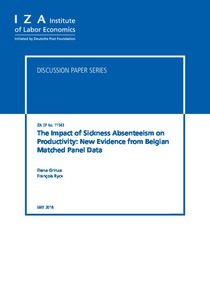The impact of sickness absenteeism on productivity: new evidence from Belgian matched panel data

Grinza, Elena ; Rycx, François
Institute of Labor Economics, Bonn
IZA - Bonn
2018
26 p.
sick leave ; absenteeism ; productivity
Discussion Paper
11543
Working time and leave
English
Bibliogr.
"We investigate the impact of sickness absenteeism on productivity by using rich longitudinal matched employer-employee data on Belgian private firms. We deal with endogeneity, which arises from unobserved firm heterogeneity and reverse causality, by applying a modified version of the Ackerberg et al's (2015) control function method, which explicitly removes firm fixed effects. Our main finding is that, in general, sickness absenteeism substantially dampens firm productivity. An increase of 1 percentage point in the rate of sickness absenteeism entails a productivity loss of 0.24%. Yet, we find that the impact is much diversified depending on the categories of workers who are absent and across different types of firms. Our results show that sickness absenteeism is detrimental mainly when absent workers are high-tenure or blue-collar workers. Moreover, they show that sickness absenteeism is harmful mostly to industrial firms, high capital-intensive companies, and small- and medium-sized enterprises. This overall picture is coherent with the idea that sickness absenteeism is problematic when absent workers embed high levels of firm/task-specific (tacit) knowledge, when the work of absent employees is highly interconnected with the work of other employees (e.g., along the assembly line), and when firms face more limitations in substituting temporarily absent workers."
Digital
The ETUI is co-funded by the European Union. Views and opinions expressed are however those of the author(s) only and do not necessarily reflect those of the European Union or the ETUI.